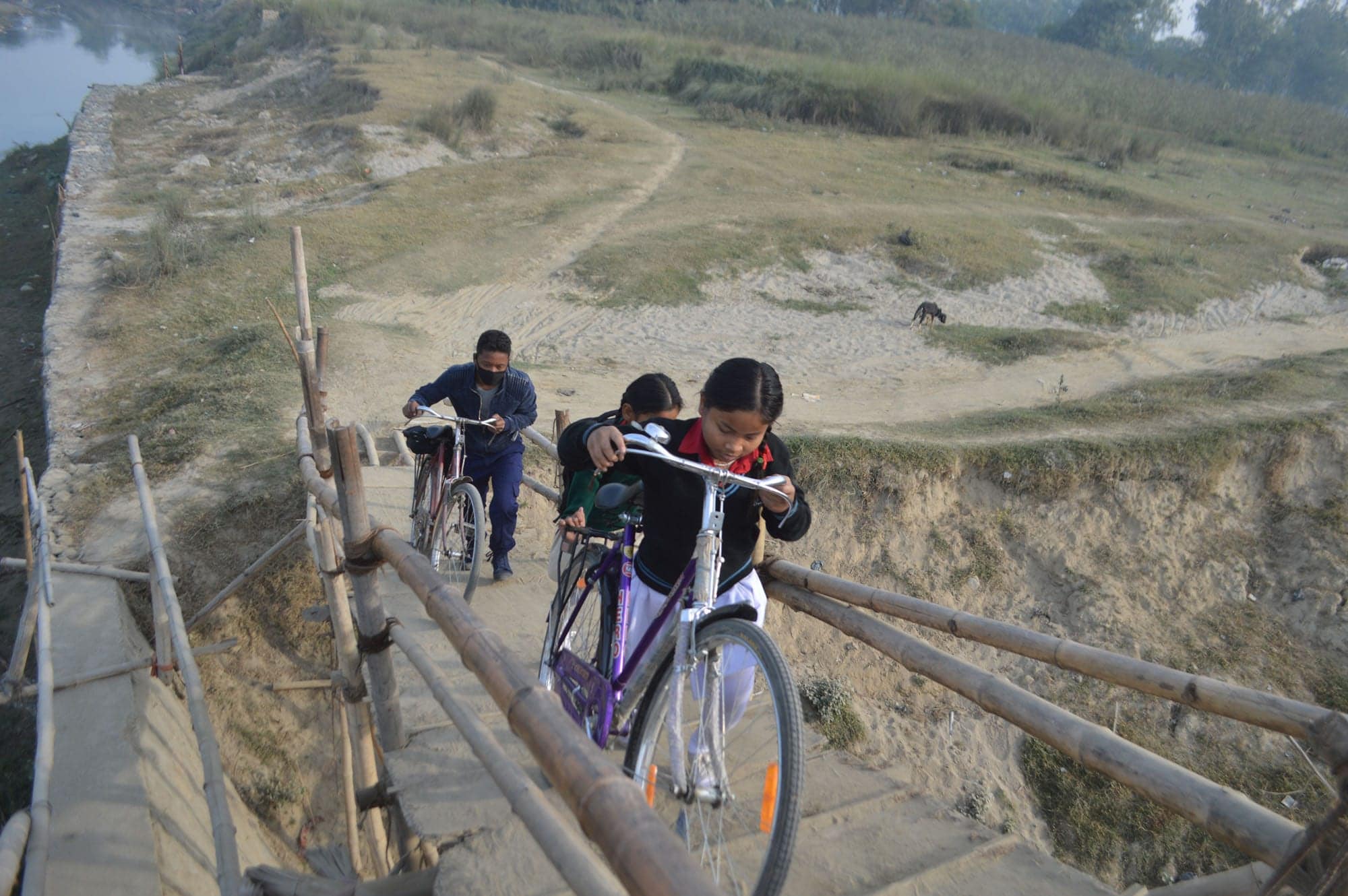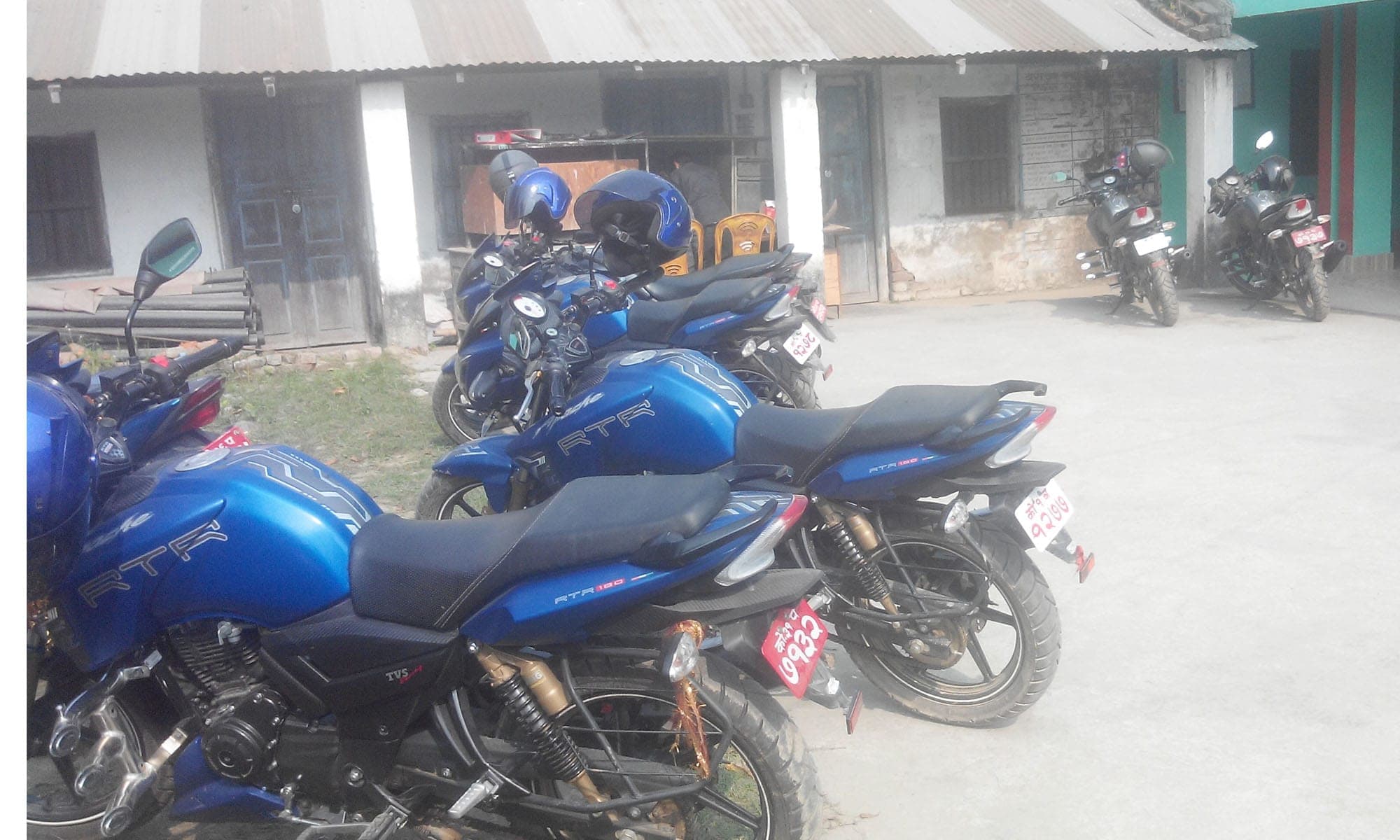Katahari Rural Municipality in Morang has fixed salary for people’s representatives and staffers and purchased vehicles. The law bars the local federal unit from doing so
-Kamal Rimal, Biratnagar: Centre for Investigative Journalism-Nepal
The roads and bridges damaged by the floods in Katahari, Morang, in August last year have yet to be repaired. This has affected people’s mobility. School children are still crossing bridges ruined by the floods. People continue to use the bridge, supported by bamboo poles, over the Singhiya stream that links Biratnagar with the Khoria settlement in Katahari.

Student bicycling on the bridge over Singhiya stream,Katahari-1
But this has failed to draw the attention of the representatives of Katahari Rural Municipality, elected by the local people. The representatives have taken two major decisions so far. One is fixing their pay, the other buying four-wheelers and motorcycles.
Both these decisions have come into force. According to the decision taken in the first month of the current fiscal year, the rural municipality chief will get Rs 35,000 and the deputy chair Rs 30,000 in monthly pay. The ward chairpersons will get Rs 36,000 in total each month including Rs 20,000 in salary, Rs 6,000 for communication and fuel, and Rs 10,000 in lunch allowances.
According to the constitution of Nepal, the pays and perks for the elected officials and staff at the local level cannot be determined until the provincial laws are drafted. According to Article 227, the facilities for the members of village and municipal councils and other arrangements for the staffers at rural municipalities and municipalities and their offices will be as determined by the provincial law.
Local governance expert Krishna Prasad Sapkota says the pays and allowances determined by the elected representatives and staffers at any local federal unit for themselves will be unconstitutional. “The constitution does not permit decisions on salary and allowances,” said Sapkota. “Pays and perks determined without provincial laws are unconstitutional.”
Morang District Coordination Committee chief Naresh Pokhrel said the Katahari representatives had fixed their pays arbitrarily. He said the elected officials had ignored his warning to maintain the dignity of their office. “We’ve been reminding them not to do works that might be questioned by the people,” said Pokhrel. “They don’t listen to others saying that they run their own government.”
The rural municipality has also purchased the vehicles hastily. It has spent more than Rs 6.6 million on a jeep and motorcycles. It bought a Scorpio jeep for Rs 4.135 million while 10 motorcycles cost Rs2.475 million in total. Additionally, goods worth Rs 90,000 have been purchased to decorate a jeep bought on November 30, 2017 for the village chief and deputy chief.
Katahari village chief Ram Kumar Kamat said they bought the vehicle as the one rented earlier had been costly. “We bought the vehicle believing it to be cheaper to maintain,” he said. Ward chairman of Katahari-4 Manth Sheikh said the motorcycles were purchased to facilitate field works of the people’s representatives and officials.

Motorcycles given to ward chairpersons of rural municipality.
Eight 180cc TVS-made Apache two-wheelers were bought on October 30, 2017 for seven ward chairpersons and one engineer for a total of Rs 2.04 million. A short while later, two Honda-made Shine motorcycles were bought for two staffers for a total of Rs 430,000. The elected officials and the staffers have sold their old motorcycles after they got new ones from the village council.
According to the Local Government Operation Act, no local level has the authority to spend without drafting local laws and financial guidelines. Local governance expert Shyam Bhurtel says there is no provision for advance spending as well. “Spending has to follow drafting of local laws and budget approval from the local assembly,” said Bhurtel. “Knowingly or unknowingly, local federal units seem to be spending as they please.”
Executive Officer Minraj Koirala admitted that the rural municipality had spent from its treasury without formulating laws. “Budget laws and fiscal rules have not been readied. The jeep and motorcycles were bought to be managed from internal resources,” said Koirala. He claimed that the village council had passed the budget for vehicle purchase.
The Ministry of Federal Affairs and Local Development is planning to buy vehicles for the rural municipalities across the country with an aim to facilitate their works. Ministry spokesperson Rudra Singh Tamang says plans are afoot even to grant a vehicle to resource-deficit federal units. “We are mulling over providing vehicles even by managing the existing ones,” said Tamang. “We’re determined to find a way out for village councils facing hardships.”
As their local representatives are busy fixing their pays and purchasing vehicles, the flood-affected people in Katahari are waiting for the government’s relief grant. The flood-hit people in Katahari-2 are deprived of relief as the local representatives have yet to identify actual victims. The election code of conduct came into force while the flood-hit people were being identified, halting distribution of relief funds. Katahari-2 ward Chairman Kishor Pande said the code of conduct barred distribution of relief fund amounting to nearly Rs 250,000 meant for 57 flood-displaced people. The August floods displaced 1,600 people in Katahari Rural Municipality.



